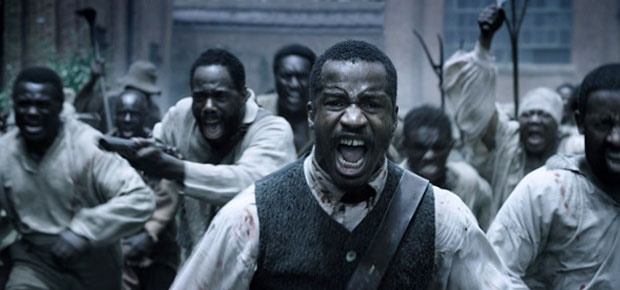
What it's about:
The (mostly) true story of Nat Turner, the slave/ preacher who used his influence to incite a bloody uprising against slave owners in the American South.
What we thought:
Despite intentionally “stealing back” its name from the groundbreaking but morally despicable 1915 D.W. Griffiths film, The Birth of a Nation mostly exists in the long shadow of 12 Years a Slave, the multiple-award-winning modern masterpiece that set a new bar for films about slavery. Sadly for it and its now infamous writer/director/star, Nate Parker, it doesn't come anywhere close to matching that film's emotional power, its complex intelligence or its quietly brilliant filmmaking.
This isn't quite to say that there's nothing to recommend about the The Birth of the Nation, as it is an admirably ambitious directorial debut for Parker and its depiction of the horrors of slavery are effective enough – though, it's actually the more subtle and mundane examples of such, rather than the more outwardly and shockingly barbaric, that are most memorable and powerfully drawn. The central and fatal problem, however, is that Parker both writes and directs the film with a bluntness and lack of subtlety that not only makes the film unconvincing as a drama but also utterly fails to do justice to a story that, in real life, was loaded with moral and historical complexity.
While Parker paints Turner as a conflicted but ultimately noble hero whose revenge against the slave-owners who tormented him – not least of all his own “master” and once friend, Samuel (Arnie Hammer in solid form) – is the cathartic and thoroughly righteous climax of his story, the real Nat Turner was someone who turned his righteous desire to strike back against a gravely unjust system into something that resulted in the bloody deaths of not only numerous slave owners but dozens of innocent white women and children as well.
It was also a revolution that arguably accomplished little more than the further murderous lynchings of innocent black men, women and children throughout the South. And yet, of course, the repulsive system of slavery certainly deserved a reaction and the American Civil War was still a couple of decades away from happening so a case can certainly be made that Turner's bloody rampage was the inevitably tragic but fundamentally moral reaction to a far greater evil.
That none of these questions are ever really dealt with sufficiently by the film results in something that may well be honourably intentioned but ultimately ends up being more than a little questionable in terms of its own morality. Not only does it enjoy its own racially charged violence just a bit too much for comfort, its depiction of white people being very nearly all evil (even the seemingly good ones) and black people being very nearly nothing but victims prior to this violent outbreak is simplistic to the point of being offensive. Even Tarantino's intentionally trashy and exploitative (and I mean that in the best way possible) Django Unchained has a far more nuanced and subtle portrayal of race relations in the 19th century US South.
More than just being historically and potentially morally problematic, however, the film's bluntness is a huge problem for it on a purely dramatic level. While Parker is rather good in the lead role and the rest of the cast do fine, there is little in the way of characterisation beyond Turner himself and, perhaps, Samuel (though even there, his characterisation may not add up to a whole lot more than he's kind of a douche when money and booze are involved) with very nearly everyone else in the film being little more than cyphers.
Mix this is with some creaky, on-the-nose dialogue and somewhat laborious pacing and you're not left with anything particularly engaging on even the most basic of levels. It does have a few eye-catching and compelling moments, to be fair, but even these are countered by some occasionally flat, dull cinematography and a number of scenes that are so on-the-nose and cliché as to remove you entirely from the story itself.
This is particularly egregious in a montage of scenes that serves to act as the horrible aftermath of the film's climactic events but any impact that these signs might have are shattered by the song choice of Billy Holiday's Strange Fruit, which may indeed be an undeniably classic song that deals with black lynchings but is so ludicrously obvious a choice that the result is something along the line of using Marvin Gaye's Let's Get it On (or, worse, anything by Barry White) to unironically soundtrack a sex scene in a serious drama.
So, yes, there is what to admire and like in The Birth of a Nation and there's certainly potential there if Parker's personal scandals don't entirely derail his film career but, honestly, you'd be better off just reading about Turner's life instead – especially if you top it up with a viewing of 12 Years a Slave.




 Publications
Publications
 Partners
Partners















